| Listing 1 - 3 of 3 |
Sort by
|
Book
ISBN: 9780822345558 9780822345640 Year: 2009 Publisher: Durham Duke university press
Abstract | Keywords | Export | Availability | Bookmark
 Loading...
Loading...Choose an application
- Reference Manager
- EndNote
- RefWorks (Direct export to RefWorks)
Authors, American --- Lesbians in literature --- Mexican American lesbians --- Mexican Americans in literature --- Mexican American women authors --- Women authors, Mexican American --- Women authors, American --- Chicana lesbians --- Lesbians, Mexican American --- Lesbians --- American authors --- Social ethics --- Anzaldúa, Gloria --- Feminism --- Theory --- Book --- Courses

ISBN: 0826327311 0585188556 0826318436 9780585188553 9780826318435 9780826327314 Year: 1998 Publisher: Albuquerque : University of New Mexico Press,
Abstract | Keywords | Export | Availability | Bookmark
 Loading...
Loading...Choose an application
- Reference Manager
- EndNote
- RefWorks (Direct export to RefWorks)
This desert mystery novel, set in Palm Springs in 1983, is from one of Chicana literature's finest writers.
Mexican Americans --- AIDS (Disease) --- Mexican American lesbians --- Patients --- Coachella Valley (Calif.) --- Chicana lesbians --- Lesbians, Mexican American --- Lesbians --- Fiction. --- Acquired immune deficiency syndrome --- Acquired immunodeficiency syndrome --- Acquired immunological deficiency syndrome --- HIV infections --- Immunological deficiency syndromes --- Virus-induced immunosuppression --- FICTION --- General. --- Fiction --- Metafiction --- Novellas (Short novels) --- Novels --- Stories --- Literature --- Novelists --- Philosophy

ISBN: 0292709714 0292796250 Year: 2006 Publisher: Austin : University of Texas Press,
Abstract | Keywords | Export | Availability | Bookmark
 Loading...
Loading...Choose an application
- Reference Manager
- EndNote
- RefWorks (Direct export to RefWorks)
With the 1981 publication of the groundbreaking anthology This Bridge Called My Back: Writings by Radical Women of Color, Cherríe Moraga and Gloria Anzaldúa ushered in an era of Chicana lesbian writing. But while these two writers have achieved iconic status, observers of the Chicana/o experience have been slow to perceive the existence of a whole community-lesbian and straight, male as well as female-who write about the Chicana lesbian experience. To create a first full map of that community, this book explores a wide range of plays, novels, and short stories by Chicana/o authors that depict lesbian characters or lesbian desire. Catriona Rueda Esquibel starts from the premise that Chicana/o communities, theories, and feminisms cannot be fully understood without taking account of the perspectives and experiences of Chicana lesbians. To open up these perspectives, she engages in close readings of works centered around the following themes: La Llorona, the Aztec Princess, Sor Juana Ines de la Cruz, girlhood friendships, rural communities and history, and Chicana activism. Her investigation broadens the community of Chicana lesbian writers well beyond Moraga and Anzaldúa, while it also demonstrates that the histories of Chicana lesbians have had to be written in works of fiction because these women have been marginalized and excluded in canonical writings on Chicano life and experience.
Lesbians' writings, American --- American literature --- Mexican American lesbians --- Mexican American women --- Women and literature --- Mexican American women in literature. --- Mexican Americans in literature. --- Lesbians in literature. --- History and criticism. --- Mexican American authors --- Women authors --- Intellectual life. --- Literature --- Chicana lesbians --- Lesbians, Mexican American --- Lesbians --- English literature --- Agrarians (Group of writers)
| Listing 1 - 3 of 3 |
Sort by
|

 Search
Search Feedback
Feedback About
About Help
Help News
News